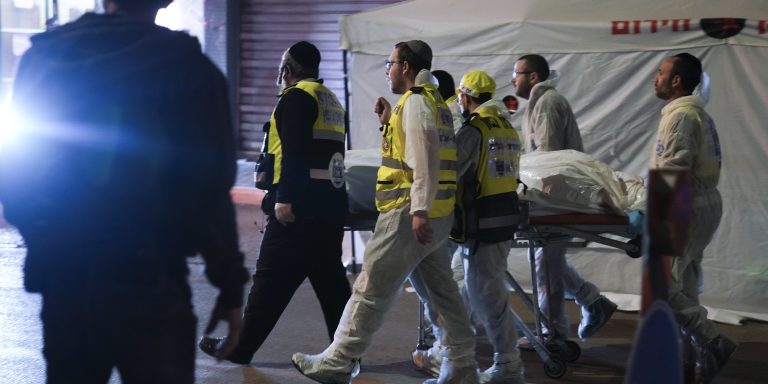INTELBRIEF
March 31, 2022
IntelBrief: Terror Attacks Rock Israel, Leaving 11 Dead Following Wave of Violence

Bottom Line Up Front
- A wave of terrorist attacks has rocked Israel over the past several weeks, leaving 11 dead and many more injured as the country grapples with its most serious terror threat in years.
- Two terror attacks this week in Israel were perpetrated by Arab Israelis with alleged links to the Islamic State (ISIS).
- Israeli Prime Minister Naftali Bennet released a video in which he promised a strong response, taking note of the violence perpetrated by “those who want to hurt us at any price” due to “hatred of Jews, of the State of Israel.”
- With tensions high, the security forces were on alert, given the forthcoming Ramadan holiday, as well as a recent summit hosted by Israel and attended by the signatories of the Abraham Accords, Egypt, and the U.S.
A wave of terrorist attacks has rocked Israel over the past several weeks, leaving 11 dead and many more injured as the country grapples with its most serious terror threat in years. Five attacks over two weeks have led Israel to boost security, augmenting counterterrorism forces throughout the country focused closely on deterring future attacks and restoring a sense of calm. The Israel Defense Forces (IDF) deployed troops to the occupied West Bank in an attempt to quell further attacks. The most recent attack occurred in Bnei Brak, an ultra-orthodox suburb just outside of eastern Tel Aviv on Tuesday night, when a Palestinian gunman opened fire killing five. The terrorist was neutralized by police, but the string of attacks has led many Israelis to wonder if this is the beginning of a new intifada, or uprising. Hamas praised the attack, although no group has yet claimed responsibility.
Two other attacks were perpetrated by Arab Israelis with alleged links to the Islamic State (ISIS). The ISIS angle is of note, because jihadist groups have long sought to penetrate Israel to conduct attacks or coopt and radicalize Arab Israelis to commit acts of terrorist violence, efforts which have been met with little success. While much jihadist propaganda focuses on Israel, it has been extremely difficult for groups like al-Qaeda and ISIS to follow through on their threats. Israel’s primary security threats come from other terrorist groups, including Hamas and Lebanese Hezbollah. But with ISIS’s leader Abu Ibrahim al-Qurayshi being killed after a U.S. Special Forces raid in early February, the group may be looking to launch attacks in Israel as a way of generating momentum, demonstrating to ISIS followers that the group retains the capability to mount spectacular attacks, even in its diminished state.Israeli Prime Minister Naftali Bennett released a video in which he condemned the attacks and promised a strong response, while also taking note of the violence perpetrated by “those who want to hurt us at any price” due to their “hatred of Jews, of the State of Israel.”
As Israel’s new prime minister, Bennett is also facing pressure to ensure that the state’s response is adequate and effectively eliminates the threat, particularly if there is an active ISIS sleeper cell planning further attacks. ISIS claimed an attack from last Sunday near the Israeli city of Hadera, in which gunmen killed two Israelis and wounded several others. The other ISIS-related attack, which killed four and seriously wounded several others, occurred in Beersheba, located in southern Israel, last Tuesday by a terrorist “known to the security services.” The terrorist responsible for the Beersheba attack had previously confessed in 2015 to supporting ISIS, organizing meetings of supporters and planning to travel to Syria, before being jailed for four years. He was released in 2019.
With tensions high, the security forces were on high alert, given the forthcoming Ramadan holiday—unfortunately a frequent time of increased inter-communal tension—as well as a recent summit hosted by Israel and attended by the signatories of the Abraham Accords (i.e. Bahrain, Morocco, and the United Arab Emirates), as well as Egyptian Foreign Minister Sameh Shoukry and U.S. Secretary of State Antony Blinken. A Hamas official claimed that the recent wave of attacks was a result of what he called the “summit of shame and disgrace held in the Negev.” Equally important to highlight among human security impacts in the locale are reports by the UN humanitarian agency (OCHA) that, so far in 2022 (through March 21), 18 Palestinians have been killed by Israeli forces, and 222 Palestinians have been injured by Israeli forces in Gaza and the West Bank. Broadening to the current global security context, the recent attacks in Israel have received less media attention than normal due to the ongoing conflict in Ukraine, following Russia’s unprovoked invasion in late February. Several high-profile terrorist and militant groups have criticized Abraham Accord signatories for “selling out” the Palestinians, mocking the leaders of Arab states that have engaged in diplomatic relations while the Palestinian people remain without sovereign, independent statehood.